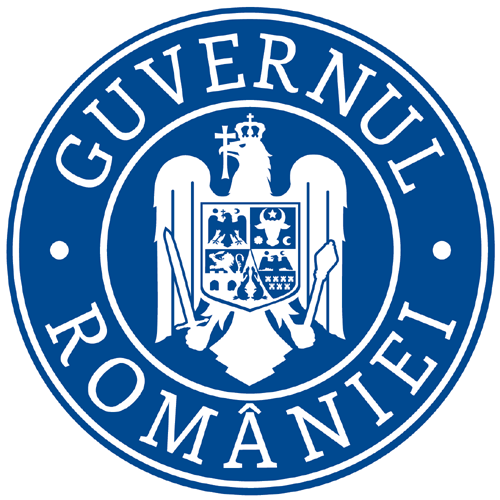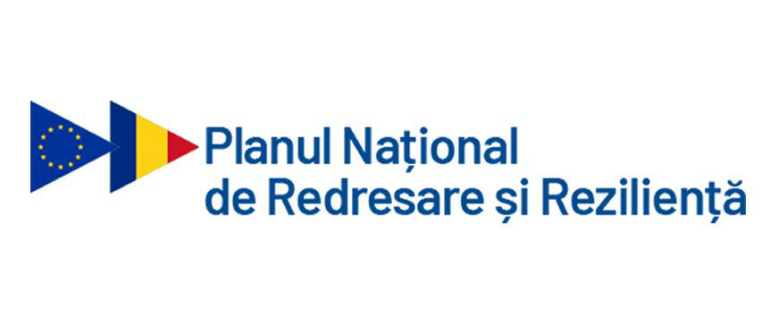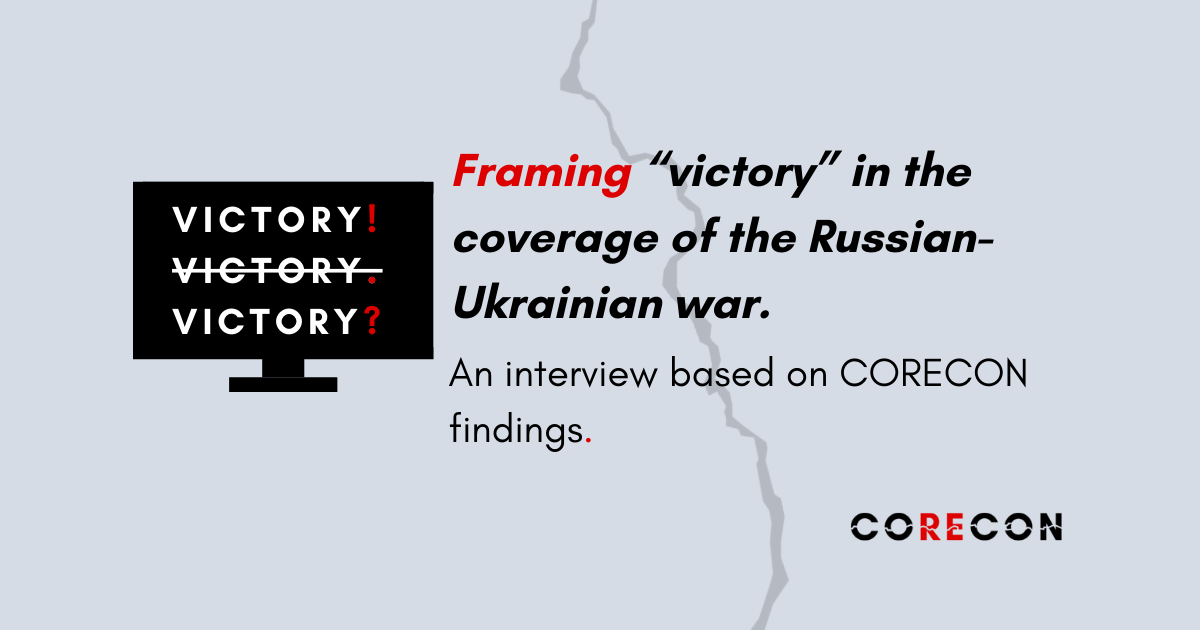Andrii Yaroshchuk is a PhD candidate in Communication at Pompeu Fabra University in Barcelona who took part in the CORECON Conference in early July 2025 and found interesting parallels between his research and the project’s findings. This blogpost reproduces some excerpts from an expert interview he conducted with CORECON research director prof. Katarzyna Molek-Kozakowska, specifically in relation to the larger implications of and insights from the studies of the Polish-language coverage of the war.
Andrii Yaroshchuk’s dissertation, titled “Strategic Narratives of Victory in Media Coverage of the Russia–Ukraine War: A Comparative Analysis of Media Perspectives from Poland, Russia, Spain, Ukraine, the UK, and the US in 2022–2025,” explores how the concept of victory is constructed in media across six different national contexts. Drawing on both quantitative and qualitative content analysis, he investigates how victory in the Russia-Ukraine war has been framed. He examines key dimensions of victory narratives, including the levels at which it is discussed, the main actors and sources shaping the narrative, the potential consequences attributed to victory, and how these elements are adapted to different national contexts.
In addition, his research incorporates a series of semi-structured interviews with scholars from related disciplines and media practitioners, seeking broader reflections on the significance of the victory theme in media coverage, including how it is currently reported, and how it might be approached in the future.
AY: What would you identify as the key characteristics of how the Russia-Ukraine war is covered in the Polish media, particularly in comparison to other wars or armed conflicts?
KMK: In Poland the coverage of the Russian-Ukrainian war seems to be influenced by the following factors: (1) the proximity to the conflict and the possible consequences of escalation that vary from political and military to economic and social; (2) politicized reporting of the war often through the prism of Polish internal power struggles, ideological and historical debates and legitimizations of specific economic decisions regarding e.g., energy security and defence spending; (3) Poland’s being the most anti-Russian country in this region. This is of course not all there is to it, but this characterization is what we aim to find out more about in CORECON, where we also pick up certain patterns in the war coverage by comparing journalistic and editorial strategies in Central and Eastern Europe and globally.
AY: To what extent would you say that Polish people and Polish media are politically polarized? And more specifically, how is Ukraine positioned within this polarization? In your opinion, how does this affect war reporting?
KMK: Polarization is increasingly noticeable in Poland’s public discourses and has been deepening for some time (a larger consequence of our political and media systems evolving). And yet, an overwhelming majority of Polish media outlets is vastly pro-Ukrainian and anti-Russian (when it comes to the war issue), which is also the dominant political framing and official position of the Republic of Poland. However, this does not preclude criticizing Ukraine or the NATO/Western allies in the case of specific decisions/actions. There is a separate set of media discourses regarding the status of Ukrainian refugees/migrants in Poland or the historical issues between the two countries dating back to 1940s, which we have explored.
The Polish press is likely to exploit political conflict and controversy and to magnify it (sometimes beyond the right proportion). It is also likely to speculate about the possible future scenarios and consequences of conflicts and to invite various voices to comment and problematize rather than to build one coherent narrative. Polish audiences are relatively skeptical of experts and political analysts, which adds to the complexity of how the war is reported. As a result, there would be diverse opinions and foci found in various journalistic genres and outlets catering to various Polish audiences.
AY: What kind of audience do Gazeta Wyborcza and Rzeczpospolita primarily serve? How might their respective political leanings shape differences in thematic focus of war coverage?
KMK: Despite the differences in political leanings, both these outlets cater to the educated middle-class and professional elites, who, in turn, can then be opinion leaders in their own networks. These two outlets are the multidimensional professional news and opinion disseminators in the country and their regional and thematic editions might vary and shape the thematic focus in varied ways. For example, the legal pages of Rzeczpospolita could attend more to the geopolitical foci and follow closely the legality of various regulatory actions regarding military spending or aid, while the socially-oriented magazines in weekend editions of GW could focus on war refugees and lived experience of survivors.
AY: Do you think it is appropriate or necessary for the media to address the topic of “victory” in a war in which the country is not directly involved?
KMK: “Victory” in Poland might not be a very useful concept and the term itself might stir conflicted emotions. “Victory talk” in journalism might be indicative of rather pathos-laden and heroism-driven narratives from history. It could also trigger or revisit the propaganda campaigns of the past communist regimes, which tended to overuse war metaphors. Everyday journalism engaging with “victory talk” might then be accused either of partisanship and bias or of pompousness and rhetorical flair.
Also “peace studies” specialists – as far as I am aware – are cautious about the terminology related predominantly to winning and losing, as this is counterproductive to resolving conflicts and reconciliation in the long run. That is why the terminology used in Polish presses could be more varied and nuanced to indicate an understanding that there will not be absolute winners in this war, because too much has been sacrificed and lost for all the sides, including Poland, to truly “win.” Obviously, Poland’s rooting for Ukraine is equivalent to thinking that Russia should be defeated and punished, but the region of Eastern Europe is going to be negatively affected by this war for decades to come.
AY: In 84.9% of Gazeta Wyborcza articles and 77.6% of Rzeczpospolita articles, “victory” appears only as a secondary topic. Would you interpret this as a deliberate editorial choice or simply a reflection of the topic’s perceived marginal relevance within Polish media discourse?
KMK: In line with the above numbers, it seems that there is an acute realization among editors that “victory” in an absolute meaning is not a realistic option, in the sense that the destabilization and destruction inflicted on the CEE region will be palpable for decades to come. I have a feeling that, in a diplomatic sense, all sides involved are likely to be offered a chance to define the final outcome as “not losing” the war rather than a victory. The victory is more likely to be indirectly framed in terms of achieving relative peace and stability for Ukraine and security for Poland. War coverage in Poland is likely to be pessimistic in tone, which may explain the relative backgrounding of “victory talk” (as a secondary topic). Definitely, we will continue to see particular political actions or individual leaders’ decisions to be labelled as victories or defeats in various senses for the sake of immediate politics.
AY: In my analysis, tactical-level references to victory appeared in just 25.8% of Gazeta Wyborcza articles and 20.4% in Rzeczpospolita. Why do you think tactical battlefield developments receive so little attention in Polish coverage?
KMK: Poland has got many channels where battlefield reports are available in real time. Meanwhile, Polish TV stations, some online portals and dedicated social media channels might actually be shown to feature a high number of reports on tactical issues, with the constantly updated numbers of personnel, pieces of equipment, missiles, etc. lost or intercepted. The war coverage in Polish opinion-making sources is characterized by their function of synthesizing and giving meaning and depth of these individual reports from the battlefield and the ability to reach out to experts for explanatory commentary and interpretation. Polish audiences do not subscribe to these two outlets for immediate news from the front, so the editors are probably framing the reports in political or geopolitical terms and in accordance with their audience design.
AY: Russian victory is more frequently personified, Vladimir Putin emerges as a central figure in both media outlets’ victory narratives (he ranks among the top two most frequent actors). In contrast, Ukrainian victory tends to be framed in abstract national terms (e.g., “Ukraine” rather than named leaders). How would you interpret this asymmetry in the representation of actors?
KMK: In two ways: for one, the metonymy “leader for nation” is relatively common in international political coverage and is particularly well-suited when referring to autocratic/authoritarian regimes. This means that identifying Russian actions as initiated by Kremlin or authorized by Putin is close to the Polish audiences’ perception of reality. For another, it is relatively clear in Poland that this war is fought against the Ukrainian nation, even though the current Ukrainian authorities are strategically positioned to take decisions about the response. I guess there is a general understanding in Poland that any Ukrainian victory will be a result of collective effort of the whole society, with international support, and not the result of particular actions of the Ukrainian leaders.
AY: Regarding sources: in 31.3% of Gazeta Wyborcza cases and 26.5% in Rzeczpospolita, journalists themselves are the main voices articulating the concept of victory. Other dominant sources include experts, especially in Rzeczpospolita (32.7%), and in Gazeta Wyborcza (19.7%), and Ukraine-like-minded actors (usually Polish officials: 25.8% in GW, 16.3% in RZ). From your perspective, who is entitled, or best positioned, to define what victory means in a war in which Poland is not a direct participant?
KMK: I do not think there is one framing of victory that Polish journalism is seeking but rather the problematization of what could be counted as victory at various levels of understanding of the conflict and regarding various frameworks of reference. I feel that Polish politicians might be referenced when discussing “victory” as a way to boost their political capital or as a stronger military policy pledge, which would clearly index their priorities and values in an attempt to win some voters. Meanwhile journalists might adopt “victory talk” to motivate experts, analysts or politicians to reveal their positioning and to delve deeper into various likely scenarios. In this way, the Polish editors could very well use Ukraine/Russia “victory talk” in the hypothetical mood in order to elevate the newsworthiness of the coverage and to tease out a range of attention-drawing responses.
AY: In the context of Russia’s war against Ukraine, do you believe Polish media should strive for “balance of perspectives”? For example, is it justified that voices such as Russian officials are largely absent from the victory narrative? (Note: My data show that Russian authorities are the dominant source in only 1.5% of Gazeta Wyborcza and 2% of Rzeczpospolita passages on victory.)
KMK: No, propaganda and disinformation should not be reported in order not to give these contents additional prominence. In Poland there is no doubt as who the aggressor and who the victim is, so it is not morally justified for the editors to be giving space to explain the aggressor’s argumentation. In journalism studies (especially on climate change coverage and other cases of historical conflict reporting, such as the issue of Holocaust denialism), it has been shown that the journalistic value of “balance” should not always be pursued. However, in CORECON we have studied how the Polish media tend to be demystifying, delegitimizing and debunking certain information (from Russian sources) that is regarded as propagandistic, such as the use of the term “special operation” as a misnomer.
AY: In my analysis, Ukrainian officials appear as dominant sources in only 4.1% of Rzeczpospolita articles and 6.1% in Gazeta Wyborcza, while Ukrainian civilians are more frequently cited — 10.2% in Rzeczpospolita and 6.1% in Gazeta Wyborcza. Meanwhile, military actors from both Ukraine and Russia are entirely absent as dominant sources in both outlets. How would you explain this pattern?
KMK: I’m not sure how available these “military actors” are to Polish correspondents. I would imagine that active duty military are not free to offer their voice without authorization (this has been confirmed for example by CORECON conference’s keynote speaker – retired major of the Romanian Ministry of Defence Constantin Spinu), and if they have to follow the authorization protocol, it is simply easier and more reliable for journalists to resort to asking or following the statements of officials, as they are the sources that produce media materials on a daily basis. Also using vox pops or testimonials from witnesses, civilians and the population at large is relatively common and is used to offer a range of views and maybe to contrast the official with unofficial sources. I’m not sure if the proportions mean anything significant or if they simply reflect the resources that a given outlet has at its disposal to seek these diverse voices/sources. This may be the case of a larger “journalistic culture” in Poland, where outlets compete for attention and try to distinguish themselves by offering “insider” perspectives.
AY: War fatigue has become widespread in many countries. In your view, how could Polish media sustain public engagement with the war, without resorting to sensationalism or oversimplification?
KMK: There is not one recipe for an ethical and responsible war coverage, especially with such fragmented audiences, diffuse mediascapes, contradictory political interests or dynamic developments in military and media technologies. In CORECON we are collecting good journalistic practices and problematizing unreflective (politicized or profit-driven) war journalism. One could even venture to claim that sometimes oversimplification and sensationalism could be used in order to mobilize depoliticized publics in the name of a clearly morally charged issue and in view of coverage fatigue, but such techniques must be evaluated by any outlet against possible risks of losing reputation, or being accused of manipulation. In CORECON we have been studying how tabloid journalism and amateur journalism has offered various strategies to engage audiences. There is not much to be done against coverage fatigue or desensitization, as there are common human cognitive defence mechanisms to cope with negative information, but we do need to raise awareness of these mechanisms.
AY: From your point of view, what should be the key features of a responsible and ethical media narrative on “victory” in the context of war? What elements should journalists consider when constructing or referencing victory?
KMK: I believe that the journalistic profession should be self-reflective and responsive to ethical challenges imposed by disinformation campaigns and AI-powered or algorithmic biases. This is something I hope we can contribute to when working with journalism and communication students. The constant re-evaluation of journalistic standards, and the analysis of “unwanted” consequences of certain types of war coverage could be seen as a practical consideration of what forms and versions of “victory talk” are welcome. For example, ensuring meticulous referencing accuracy (who said what in which circumstances), and increased fact-checking and verification might be more important with time.
AY: Thank you very much, Prof. Molek-Kozakowska, for sharing your insights. This conversation is a reminder that every war, and its media coverage, is inherently multidimensional. Reporting can be approached from many angles, each shaping public understanding and guiding political choices that may ultimately affect the course of the war. Examining how “victory,” one among many possible themes, yet a particularly important one, is framed across outlets and contexts is therefore not only an academic task, but also a way to better grasp the complex ways violent conflicts are reported, perceived, and remembered.





